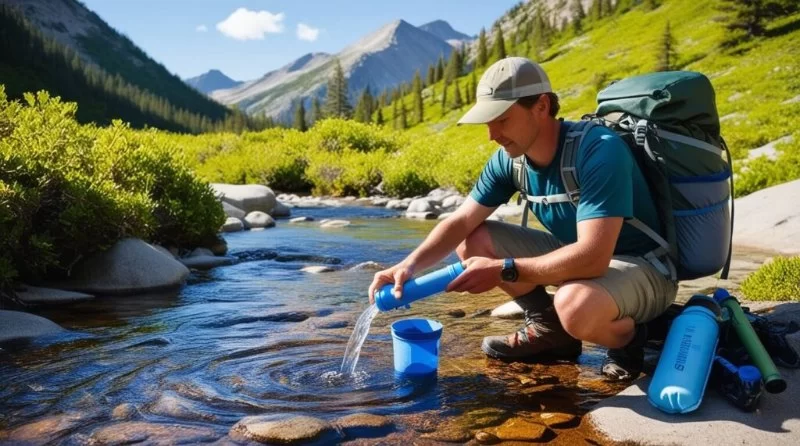Learn how to filter and purify water in the backcountry using practical techniques, reliable tools, and expert tips for safe hydration during camping and wilderness adventures.

- importance-of-clean-water-in-the-backcountry – Importance of Clean Water in the Backcountry
- types-of-water-contaminants-and-risks – Types of Water Contaminants and Risks
- portable-water-filters-and-purifiers – Portable Water Filters and Purifiers
- natural-and-chemical-purification-methods – Natural and Chemical Purification Methods
- step-by-step-backcountry-water-purification-guide – Step-by-Step Backcountry Water Purification Guide
- real-life-camping-experiences-and-tips – Real-Life Camping Experiences and Tips
- maintaining-water-filtration-equipment – Maintaining Water Filtration Equipment
Importance of Clean Water in the Backcountry
Access to safe drinking water is critical for survival and health during backcountry adventures. Contaminated water can lead to gastrointestinal illnesses, dehydration, and other serious health risks. Learning how to filter and purify water in the backcountry ensures that hikers, campers, and overlanders stay hydrated and healthy throughout their journey.
Water safety becomes even more crucial in remote areas where medical assistance is not immediately available. Proper preparation, knowledge, and equipment help prevent preventable waterborne illnesses and enhance the overall outdoor experience.
Types of Water Contaminants and Risks
Understanding potential water contaminants is essential for effective purification. Contaminants can be biological, chemical, or physical. Biological threats include bacteria, protozoa, and viruses, while chemical pollutants may come from industrial runoff or naturally occurring substances like heavy metals. Physical debris, such as sediment or organic matter, can also affect water safety.
Knowing the type of contamination helps select the most appropriate filtration or purification method. For instance, some filters remove protozoa but not viruses, while chemical treatments can address viral pathogens effectively.
Portable Water Filters and Purifiers
Portable filtration devices are a reliable solution for backcountry water safety. They vary in design and functionality, including pump filters, gravity filters, and straw-style filters. High-quality filters remove bacteria, protozoa, and particulates, making water safe to drink from streams, rivers, or lakes.
For added protection, some purifiers use UV light or chemical cartridges to neutralize viruses. Overlanders and backpackers often carry compact multi-stage filters to balance efficiency, portability, and safety during extended trips.
Natural and Chemical Purification Methods
Beyond mechanical filters, backcountry enthusiasts use natural and chemical methods to purify water. Boiling is one of the simplest and most effective techniques, killing most pathogens. Chemical treatments, such as iodine or chlorine tablets, provide lightweight, portable alternatives for emergencies.
Some adventurers also employ natural sedimentation by letting water settle and then carefully decanting clear water. Combining these methods ensures maximum safety, particularly when water sources are uncertain or heavily contaminated.
Step-by-Step Backcountry Water Purification Guide
1. Identify a clean water source away from stagnant pools or obvious contamination. 2. Pre-filter water through a cloth or coffee filter to remove debris. 3. Use a portable water filter or purifier according to manufacturer instructions. 4. If desired, apply chemical treatment or boiling to ensure complete pathogen elimination. 5. Store purified water in clean containers and avoid cross-contamination.
Following this structured approach ensures that water is safe for consumption, reducing the risk of illness and improving overall endurance and wellbeing during backcountry activities.
Real-Life Camping Experiences and Tips
A group of hikers in the Pacific Northwest shared how a combination of gravity filters and chemical tablets saved them from a stomach illness outbreak during a multi-day trek. Their experience underscores the importance of carrying multiple purification options.
Similarly, overlanders traveling through remote desert trails reported using portable filters along with UV sterilizers to reliably hydrate without relying on potentially unsafe natural sources. These stories emphasize preparedness, adaptability, and knowledge in backcountry water management.
Maintaining Water Filtration Equipment
Proper maintenance extends the lifespan and effectiveness of water filtration devices. Cleaning filters after each use, replacing cartridges as recommended, and storing equipment dry prevents bacterial growth and mechanical failure. Experienced backcountry travelers recommend routine checks before each trip to ensure reliability.
For recommended water filters, purifiers, and expert guidance on safe backcountry hydration, Pine Cliff Resort offers a curated selection of products and advice to support outdoor enthusiasts in all conditions. This ensures reliable, clean water access for safe and enjoyable adventures.
Campsite 229 (Full Hookup)
229 State Pk Rd 22, Mt Sterling, OH 43143, USA
Visit Location PageSweet Pine RV and Tipi Campground
1283 Starr School Rd, Browning, MT 59427, USA
Visit Location Page